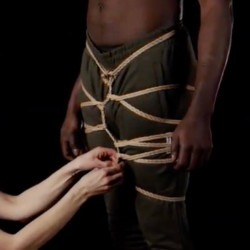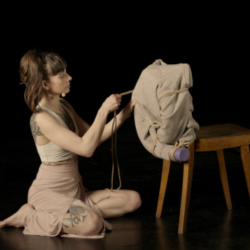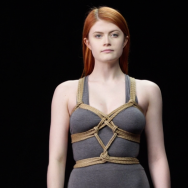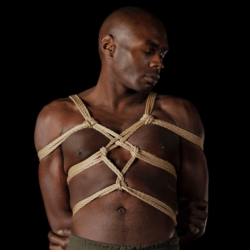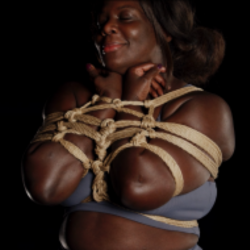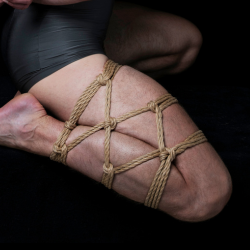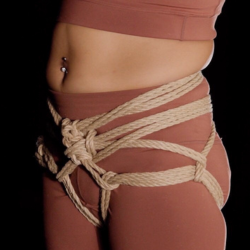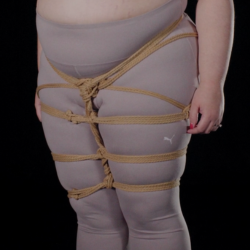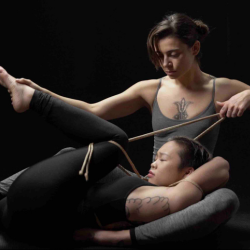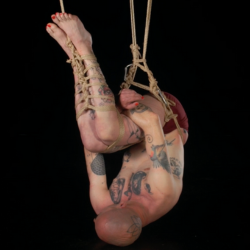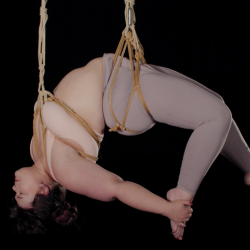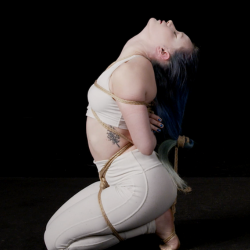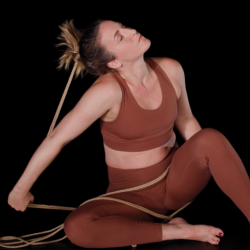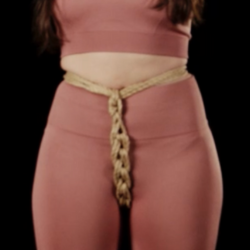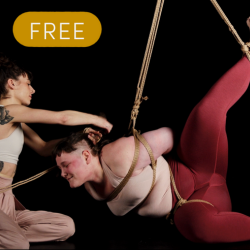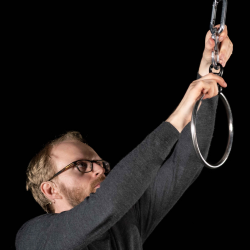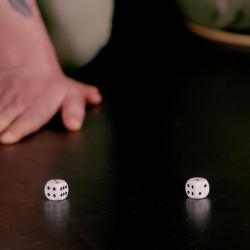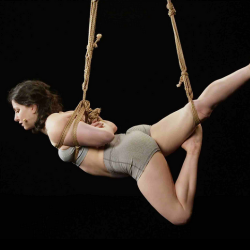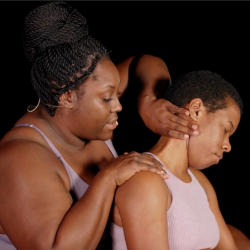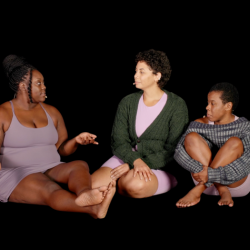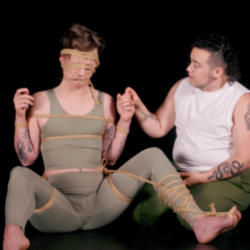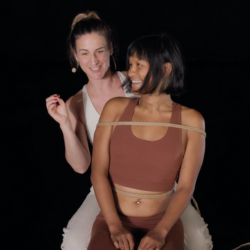EP 25
EBIBEX
Exploring the intricacies of rope, intimacy, and online censorship, EbiBex's discussion intertwines the art of capturing intimate moments through photography with thought-provoking reflections on the complexities of social media restrictions.

Ebibex (she/they) is a queer, masochistic rope bottom who has been practicing rope alongside her partner, DWL (he/him), for nearly eight years. Together they have taught and shared their experiences locally and internationally for many years.
Instagram: https://www.instagram.com/shrimplythebex/
Twitter: https://twitter.com/EbiBex
Wicked Wren [00:00:11] Hello everyone, and welcome to the Shibari Study podcast. I'm your host, Wicked Wren, and today I have on Ebibex. Ebi uses she/they pronouns. Ebi is a queer masochistic bottom. She's in the Baltimore area and she's been involved in kink for about ten years. How are you?
Ebibex [00:00:29] I am doing okay for a Tuesday.
Wicked Wren [00:00:32] So you're a self-proclaimed bondage fossil?
Ebibex [00:00:38] Yes, a term I don't want to say it's original, I'm pretty sure that I stole it from someone else. And it used to be used in affection towards other people. And then at some point, I realized that, Oh, that's... that's kind of me.
Wicked Wren [00:00:54] Now you're like, Oh, wait, that's actually me. Your poor little bones are cracking and stuff in suspensions.
Ebibex [00:01:00] Like actually. Like everything just pops now. Like...
Wicked Wren [00:01:06] I mean, it's a part of getting older. Has there been any things that you've like done differently as you have been aging in rope? And to be clear, you're not you're not old. You know, let's be clear with everyone.
Ebibex [00:01:19] Not old but like I've been, I've been saying my current 34-year-old body is not the same as my brand new to rope 24-25-year-old body.
Wicked Wren [00:01:31] Yeah. Yeah.
Ebibex [00:01:32] So that is a very real thing. And more informed people than I I'm sure have talked about, you know, the physical effects of rope. But like, just from my own personal standpoint like it is – it does take a toll. I'm doing it for this long and to some degree at the level and frequency I have done it... It's noticeable. My shoulders are a lot crankier than I suspect they would be otherwise. But in terms of doing differently, that's honestly something I'm still in the process of figuring out and has been kind of one of my personal challenges. In the last few years of realizing that I can no longer do rope the way I could when I was 28. So slowing some things down a little bit, definitely going for quality versus quantity in terms of like how often I tie or how often I get tied. But yeah, definitely something I am still figuring out for myself and what that means and what that looks like. Cause it's a thing.
Wicked Wren [00:02:45] Yeah. And speaking about quality over quantity, [00:02:50]what do you value in rope? [0.9s]
Ebibex [00:02:52] Whew... That's a great question. And I like to think that it hasn't actually changed all that much. Maybe the details. But in terms of what drew me to rope and what keeps me here is it's very much a form of intimacy that I did not encounter in any other format that for me it inhabits its own little bubble that is beyond platonic or romantic or sexual or erotic. And it can be all of those things. But it's really this way for me to connect with somebody in this very unique way that I kind of have yet to find with anything else. And that was one of the first things that drew me to it. And it's one of the things that, that still keeps me keeps me doing it.
Wicked Wren [00:03:45] Yeah. And your partner is also in rope.
Ebibex [00:03:49] Yes. DWL. If you hear me reference him, it'll probably be as T or Tom, but DWL on most Internet places.
Wicked Wren [00:04:00] Amazing. So you've been in rope for a while. I want to go back to the beginning. How was getting into the scene?
Ebibex [00:04:09] Whew. So that's, that's like... a lot of luck. I feel like part of being a person, being a millennial to some degree and being chronically online but part luck. My partner and I got very lucky in that the time and place where we got into rope, we had a lot of opportunities in terms of access of education, access to different kinds of education from a lot of different instructors. So there's definitely like some degree of privilege that came with that of just being in a major metropolitan area in the U.S., having enough... I don't know about disposable but flexible income, I guess, that we chose to put towards this. Because we actually got into the, the kink scene and the rope scene in the Philadelphia area. And this would have been back in, I guess, like 2013, 2014. Found a rope event on Fetlife. It was close enough and I was at this point still trying to convince my partner that like we should do this! Signed up and more so than the event itself was the people we met and a lot of those people that some we are still friends with, some who are chosen family to this day, but that really was what helped us get, get into the rope scene.
Wicked Wren [00:05:48] Were you scared to go?
Ebibex [00:05:53] Nervous? I think there's a little bit of, I guess, partner privilege there in that like because it was two of us and we were both pretty...We don't really know what we're getting into! So I think that made it a little bit easier but absolutely nervous. Absolutely. Like, you know, what are we getting into? Do we have any idea? Like what is this? What are we doing? One of the things I distinctly remember about that weekend was it was Mother's Day weekend. And I got a very angry phone call from my mom because I was away somewhere that I wouldn't tell her where.
Wicked Wren [00:06:30] [00:06:30]Does your mom know about your kink life now? [1.5s]
Ebibex [00:06:32] She does now.
Wicked Wren [00:06:34] To what extent?
Ebibex [00:06:36] Not all of it, although I suspect that she knows more than she lets on.
Wicked Wren [00:06:43] Because you do some stuff. You're in it.
Ebibex [00:06:50] At some point after we started teaching, we – more I, I hit a point where I was just running out of reasons as to why we were going to these strange places that we never really talked about. So I kind of sat her down and it's some, some, some baby Bex lore too. So I was like, Mom, do you remember when I was like 17 and you intercepted that Amazon package that was a book about Japanese bondage? Midori's book, by the way. And this is going way back. This would have been like 2006 maybe? And that was like the only like English language resource that you could find at that time tangent. And so I'm like, So funny thing about that! And I very much presented it as – I, I definitely like hyped up sort of the artistic element and like my partner being a photographer. It was like, Oh, this is a really cool thing for him to take photos of. And it's like this skill that we're learning together! And kind of gave her that very high-level view of it and mentioned that we were starting to teach. And then I kind of gave her the, I will answer whatever questions you have, be sure you want to know the answer. And that has kind of been the policy ever since. So she knows we're non-monogamous. I'm sure she has some ideas. Again like, I was not, I was not a sneaky teenager. I was not very good at clearing my browser history. Like my parents have always had like slight concerns about me. She's a little weird. Like... but she's – and, and my mom is the one I've talked to. I kind of operate on the assumption that whatever my mom knows, my dad probably knows. But I think there's that, you know, father-daughter, I don't really want to know about anything that resembles your sex life.
Wicked Wren [00:08:55] Yeah. It doesn't exist. It's not real.
Ebibex [00:08:58] Yeah. So she's supportive in her own little ways. Like, if she knows we're teaching, you know, she'll be like, Oh, like, hope your classes go well, or things like that. And it's, it's, it's a good compromise.
Wicked Wren [00:09:11] Yeah, That's really cute. I think it's awesome to hear stories of parents being supportive.
Ebibex [00:09:15] Yeah, I remember the first time, the first time she like actually, she called me. It was one of the first times I was teaching and she actually called me. It was like, I remembered your class today, and like, I almost broke down in tears. Because I was like, You don't even know! Like some people's parents would disown them for this! And you called me!.
Wicked Wren [00:09:34] Yeah. It's very, very, very sweet. It's also funny to think that when I was 17, I didn't even know this existed. Like, no idea. And we're the same age, I had no idea that any of this was real.
Ebibex [00:09:47] I was and remain a very curious kid sometimes to my own detriment. Honestly, I wish, I wish I could remember where or how like I first heard the term shibari. I don't. I know that I was definitely like 16 and just started – I don't even think it was Google then. Whatever people, whatever we were using to search the internet at the time. And I found Midori's book and I bought it and then, you know, it would be another however many years until I could actually get into it. But it did lead to me managing to turn it into an English 102 presentation, where I convinced my roommate in college to like let me tie her up in front of class. I wish I could remember the argument I made for being relevant but...
Wicked Wren [00:10:46] In class? What was – tell me more about this. Like what kind of class is this?
Ebibex [00:10:50] It was very – it was like the basic like Karada Harness that you can find in like infographic form and has existed on Tumblr since like however long. And I really wish that I could remember like what what point I made or pretended to make or whatever. But mostly it was like I just want to talk about this cool rope bondage thing, and... Yeah. Somehow got away with it.
Wicked Wren [00:11:18] That's college.
Ebibex [00:11:20] Yeah, pretty much. Went to a liberal arts school and... Yeah.
Wicked Wren [00:11:24] So going back to when you went to that dungeon the first time or the event that had the rope at it, did you have any expectations or did you just go in being a blank slate?
Ebibex [00:11:36] I... I'm not sure about expectations. I think at that point I had so many fragments. And part of that is just like what information was available or what information I could find. So I think I just had a lot of fragments of different pieces and not enough information to know either how they fit together or even if they fit together. I mean, knowing as I do now that there are so many different styles of rope, there are so many different philosophies of it. So I think there was just a lot of curiosity and a lot of sort of hoping, hoping to see some of these pieces be put into context or put into a way that like, Oh, okay. Like, this is beyond just the, I know people like to get tied up!
Wicked Wren [00:12:34] Did y'all bring rope and tie there or did you just watch?
Ebibex [00:12:40] So we... we'd gone to like a couple small local things before the first intensive that I'm thinking of. So like we definitely had rope and had, you know, had bought a couple of books and like, you know, had been fooling around with what we could get from that and were, you know, fumbling our way through the first steps like most people do. But I think going into it being an educational thing made it a little bit easier in that like there were sort of clear expectations or at least we had a little bit more of an idea of what to expect versus just like going to a party for the first time or even a munch. I think we – right away very quickly gravitated towards like the educational things which I think benefited us in the long run. But yeah, we tied. It was not pretty. Hopefully those pictures are lost to the annals of time.
Wicked Wren [00:13:40] So fast forward a little bit in the journey. What was one of the next big markers in it? Was it like the first time you learned about suspension or... What was kind of another big marker that happened there?
Ebibex [00:13:59] That's actually... Probably... that's pretty easy because it was, it was January 2015 and it was – we had the opportunity to do an intensive with Gorgone in Philadelphia. And at the time, our friend who was actually hosting them, kind of gave us a little bit of a talk like, you know, in the months leading up to it that like – it was basically, I think you guys will be able to, you know, keep up with this but you're going to have to do a little bit of work. So like that kind of lit a bit of a fire under our butts.
Wicked Wren [00:14:35] You seem like someone that likes a challenge.
Ebibex [00:14:38] Yes, I do. So there was, there was very much that. But that intensive with Gorgone, it was, it was the first time we had, at that point, we had taken a couple of classes with some different people. I think we had done a couple, like, day or weekend intensives. But that intensive with Gorgone was the first time we really had an instructor give us the "why" behind a lot of the things we were learning, which was huge for us. And at the time, or at least in our experience at the time, was not common. It was a lot of, Here's this pattern. I'm going to tie the pattern. Now you go try the pattern. And Gorgone really felt like one of the first people who was like, Okay, here's the pattern, but here's all the reasons why we do the things the way we do.
Wicked Wren [00:15:31] So important.
Ebibex [00:15:32] And I think it was also pretty key for my partner because up until that point, he had sort of been learning for my benefit. At one of the first events we went – so you mentioned suspension and I, we, met somebody, I got suspended like the first thing we went to, you know, and in retrospect, it was maybe not the best thing, but I think a lot of us have those stories. But...
Wicked Wren [00:16:00] I think everyone does.
Ebibex [00:16:01] Yeah... You know, you don't know what you don't know. So he knew that I was into it and that like, you know, he saw me get tied up and was like, I want to be able to do that to you. But I don't think it was until this intensive that he really started to develop his own passion for it, which was like definitely a milestone in our journey because... It's one thing when you're learning something for somebody, but when you're both learning something for somebody and because you have your own interest for it, like it makes a difference.
Wicked Wren [00:16:31] It really does.
Ebibex [00:16:32] So I would say that was, that was one of the bigger milestones in our, in our journey and particularly in the early days. The early days...
Wicked Wren [00:16:42] The early days.
Ebibex [00:16:43] See, when I say things like this and I'm just like, Oh my God, like...
Wicked Wren [00:16:46] I know, I know.
Ebibex [00:16:47] Get off my lawn!
Wicked Wren [00:16:50] I know! And like, so computers weren't out yet. So what, did you find out about this in the newspaper or like, how did you all communicate?
Ebibex [00:16:59] Oh, we sent a lot of carrier pigeon.
Wicked Wren [00:17:02] Oh, my god. That's wild. Shibari Study used to do that. They sent all the tutorials... Carrier pigeons.
Ebibex [00:17:08] Yeah.
Wicked Wren [00:17:08] Well, you've really come a long way. It's pretty incredible stuff. When did you start teaching? And you do a lot of bottom-focused education. You were one of the first people that I learned bottoming stuff from. [00:17:26]At Fire. [0.2s] It was really awesome.
Ebibex [00:17:30] So I love that you mentioned Fire, because Fire was the first place I taught kind of by accident? Or not, not accident but it wasn't necessarily planned. I want to say 2016. And DWL was already teaching for Fire strictly on photography things, because Fire was one of the first cons to do photography classes alongside the rope stuff.
Wicked Wren [00:17:57] Really?
Ebibex [00:17:59] Yeah, that was not a common thing and it's still not super common, but Fire was really, I think, the first con to do something like that. And I had started to kind of workshop a class idea. Mostly just something I had sort of like been talking to friends about. And I get a message one day from another person who sometimes taught bottoming things, who was teaching at Fire with their partner and they're like, Hey, you know, Fire wanted –I'm making up numbers here but – Fire wanted two bottoming classes from me and I only have one. So I told them to reach out to you because you had this idea for a class and it was like, Oh, okay! And I think it worked out because they – it was easy for them to do since they were already bringing, bringing DWL in and bringing me in as, you know, his kind of photography bottom. So I think it was an easy way for them to like fill the slot because like, I was already going to be there. But I'm definitely grateful that they took that chance on me. I... don't know that I would have chosen my first real class to be at a convention because it was definitely intimidating. But I'm really glad that it did because it also, it really showed me that, Okay, like some of these things that I, some of these ideas that I have been playing with as, in terms of, like education, particularly regarding bottoms, is needed. That there is this gap. First that like the class was very well attended and the engagement that I got was pretty incredible and like, even to this day like I... Which is incredibly humbling every time, I still have people be like, That class at Fire was like the first bottom in class like I ever saw, and like even some people who now teach themselves are like, That was, you know, one of the things that inspired me, which is like just still mind-blowing to me. I'm like I... But yeah, there were not a lot of people teaching things from the bottoming side, at that time. Or if there were, it was not as well known. So...
Wicked Wren [00:20:26] Can you recall the big beats from that class. [00:20:29]What were the concepts? [0.8s]
Ebibex [00:20:31] Yeah. I still teach it. It's much less of a class these days or at least what I kind of consider a class and a lot more of like a facilitated discussion. But it was based around the concept of knowing yourself as a bottom and that kind of going beyond just the physical aspects of like your body in rope because a lot of the existing bottoming education at the time, from what I saw, did focus on things like flexibility or, you know, what kind of cross-training can I do? And that was in no way something I was interested in or qualified to talk about. So it was a lot more of, you know, What do I want out of rope? You know, what kind of interaction or connection or experience am I looking for? What do I bring to the table as a bottom? The, the story that I often tell to go along with that class and really be the seed of that class so to speak is I really enjoy playing matchmaker between my friends. My ultimate like world domination goal is to just make all of my friends be friends with my other friends so that like when society collapses, I can have everybody I like in my own little commune. But I introduced two people at like a play party, somebody who bottomed and somebody who topped. And the, the bottom was also fairly new, about – had been doing it about the same time as me maybe. And she kind of immediately went into their discussion like, Oh, these are my limits. These are the things I can't do. These are, you know, my injuries or whatever. And the top looked at her and she was like you know, Okay, that's good information, but [00:22:22]what do you like in rope? And my friend who was bottoming had this like look of shock on her face. That like nobody had ever led with that before. [8.9s] And I just had this like what the fuck moment of like, That's messed up. Like that we have this innate tendency to sort of lead with our weaknesses, or lead with our limits or what we can't do and that we should be so surprised when somebody asks us what we like. And thankfully, I think that has drastically changed since that initial exchange happened. But that was really the spark of that class and that kind of whole concept of, you know, knowing yourself and being able to communicate, you know, what am I bringing to this? Because we are half of the equation. Like if you are doing partnered rope like both sides matter. And particularly in a time when if you went to any convention, you were lucky if you saw bottoms names listed alongside the presenters like that just didn't happen. I still have a T-shirt from a convention back in 2015 and almost the only names listed on it are the tops. Regardless of whether, you know, they had a partner and they're presenting. And that's another thing that like thankfully has changed. And I like to think that like having both names on a teaching pair is much more recognized. There's been a lot of fight for like having bottoms recognized but that was what the landscape looked like at the time. It was... Yeah.
Wicked Wren [00:24:05] I want to go back to something you said about [00:24:07]leading with negatives or leading with No's and my thought on that is saying no is really safe. [6.3s] Because it's really definite. It's like saying, No, I don't like this thing. It's self-preservation. Whereas saying yes, there's a million kinds of yes. It's like, Yes, maybe, "Yes, and" and it also is...
Ebibex [00:24:28] Yes in these particular circumstances only.
Wicked Wren [00:24:30] Yeah. Yeah, totally. So it's easy to say no because you're like, Oh, this happened to me. And I definitely didn't like that. That's a binary choice. And also with yes, you're sitting there confronting these things like fetishes and, you know, I like to be objectified. I like this stuff. And that's scary.
Ebibex [00:24:51] It's vulnerable. It's very vulnerable which yeah, is very scary for a lot of us.
Wicked Wren [00:24:56] Yeah. And off your point of around 2015 or so having bottoms out in the conversation, I wonder if that's because bottoms started being encouraged to have a voice. Because now that seems like commonplace.
Ebibex [00:25:09] Yeah, which is amazing. And like, I – it still stuns me and... You can, we can use this a segway at a later date into the censorship thing but like, a little while back, there was a conversation on Instagram where a bunch of us who had been around for a while were sort of talking about the before times and what that landscape looked like and how different it was. And I definitely think there, there was this desire to, for us – us being people who bottom for rope – and I also think that there was – that we are starting to connect with each other. You know, because we had the Internet and, you know, the social spaces that were growing and developing. And I definitely think that made a difference because I think like I don't want to speak for anybody but myself. But like, I think for a lot of us even thinking about these things without having any kind of context or other experiences to look to, it was like, Well, maybe this is just me and this is just how things are done and I'm, you know, wrong or incorrect or whatever. But I think the Internet definitely helped us start connecting with each other and realizing like, Oh, I'm not the only one who's encountered this challenge. I'm not the only one who has struggled with this thing. I'm not the only one who has, you know, felt this disparity or this inequality. And that also kind of remains one of the pieces of advice that I continue to give is, you know, when talking to bottoms, is connect with and talk to other bottoms. Like, we are our own best resources. And I think it also helps combat the competitiveness that can happen sometimes. Again, I think this is – I think this is something I see less of now. But like, I do think there was a time and I can at least speak for myself like I know there was a time where there was this weird competitive factor where it was like, Well, who's doing the most extreme suspensions or who's doing the newest trend or who's traveling the most? Or, you know, just the, the comparison of, Oh, well, this person can hang from a single ankle and I can't, so they must be better than me. I don't think that necessarily was like overt. I don't think anybody... said it in those specific words. I think it was a more of a vibe. But I really think that encouraging community between us and to look at each other as resources and as, you know, comrades to some degree, also helps with that in that like, you know, we can learn from each other and like, the fact that we're all different is why – is what makes us, you know, fun to tie with. Because if we all have the same skills and abilities like, Okay, like you might as well get a mannequin then.
Wicked Wren [00:28:09] Yeah, exactly. Exactly. I think that some of the – the word constraint here isn't the right word. I don't know the right word to say but it's really boring when someone's like, Oh, I like everything. Do anything to me. That's boring. I want to hear about something that you like, something you don't like. And then we can together build the thing that we're going to do. How do you feel on that specific day? Are you tired? Those kinds of things.
Ebibex [00:28:33] And having it be approached as like a more collaborative thing, and, you know, I say that even acknowledging, you know, power exchange and power dynamics and like all of those different things that can exist in rope. [00:28:46]Like, something can be collaborative while still having a power dynamic. [3.9s] I use collaborative more as like, Hey, this is something we're both participating in. And maybe on one day my contribution is, I just need you to fuck my shit up.
Wicked Wren [00:29:04] Yeah, a power dynamic that isn't collaborative is just abuse. It's not... That's not the concept of a power dynamic.
Ebibex [00:29:12] One of the things I tend to harp on is like power exchange. Like, exchange is actually the important word there. And I think that gets lost on a lot of people.
Wicked Wren [00:29:20] Yeah, that's a whole rant that I have is like people that kind of misuse [00:29:25]CnC [0.0s] and stuff like that. It's like...
Ebibex [00:29:29] You know, the first part is consent, right? Like, the first part of the CnC is... Yeah. Okay. All right.
Wicked Wren [00:29:36] Well... I do want to get into talking about censorship and I think that this thought is actually a good bridge to it because looking at the Internet, seeing photos, I would see someone hanging from an ankle from this crazy thing and think that that was amazing and be like, I should do that and feel bad. But then I realized, Oh, they're probably doing that for a very small amount of time. It probably hurt a bunch. They're doing it because they feel the pressure from it. It's a cycle. And the same thing with like these power dynamics CnC things. You see a part of it and then you prescribe a bunch of shit to it that's probably not even real. And then you're like, I want to do that. And then that leads to some rough things in general.
Ebibex [00:30:19] Absolutely.
Wicked Wren [00:30:20] I would be curious to hear how the camera plays a role in your rope because your partner is a photographer. A great one.
Ebibex [00:30:28] Yeah. So the pros, I guess, to kind of start with, I mean, one of the [00:30:35]coolest things is because he was a photographer first, we have so much of our journey documented, [7.2s] which is just a very cool thing that we can go back and be like, Oh, yeah, here is our first suspension. We're not going to put that anywhere, but here it is. So for us, it's very, very much sort of wrapped up in, in our play. And we even have kind of a class on that. On like being able to photograph your rope scenes. We did recognize at some point and especially as, you know, our skills in rope grew and we were doing more things that we realized like, Hey, just the photo is missing a lot of context. And there have been, you know, discussions on various forums and Internet platforms or whatever about that and how a photo is a snapshot and you're not seeing any of, you know, the behind the scene. You're not seeing anything that led up to it. You're not seeing anything that happened afterward. I think that sometimes helped me keep my own sort of projection in check that it's like, Okay, I know from experience that this is, you know, a single moment without context. So looking at other people's things, I should at least in theory, be able to apply that same principle of like I don't know what happened behind the scenes, I don't know what happened leading up to this or afterwards. But it definitely adds another layer and became something we had to become a little bit more aware of as well, in terms of what are we putting out there. What is our responsibility to, you know, disclaim, to add context. I still don't have an answer for that. I think I have moved through various stages of, Here's all of the context because I don't want people doing stupid things on account of something I did, to, I don't care. I'm putting my pictures on the Internet. It's probably going to get deleted anyway. So I don't even have an answer as to what the happy medium is there.
Wicked Wren [00:32:55] You tend to be really good at getting deleted.
Ebibex [00:32:58] Yeah, it's almost a skill at this point.
Wicked Wren [00:33:00] Yeah. You should add it to your bio.
Ebibex [00:33:04] Really good at getting deleted.
Wicked Wren [00:33:06] Yeah. I feel like you're in a, you're in like a power exchange with the community guidelines.
Ebibex [00:33:13] But it's not what I want to be in. It's not fun, there's nothing fun about this one.
Wicked Wren [00:33:19] This is C&C for you. You know, you wanted it! This is it. This is Tumblr's C&C.
Ebibex [00:33:24] Oh... oh, Tumblr...
Wicked Wren [00:33:26] You can't get out, you know, you can't get out of it. What do you think about censorship? Do you think that it matters? Do you think that it has like a big...?
Ebibex [00:33:34] I absolutely think it matters. I mean, I think we we briefly touched on kind of the amorphous nature of our history -and our, in this case being queer folks, being kinky folks, being, you know, the rope community or the rope scenes- but that there's this very shifting fluid-ness to it. And that's really where the censorship to me seems the most harmful. Is that it is, in some cases, deleting histories. You know, every time I've had an Instagram account get deleted, like, I'm not upset about the photos. Like, I still have the photos, like, that's whatever. But the conversations I've had, the discussions that have happened and that may have been saved and, you know, because of my own stupidity, because I should know better by now, were not saved elsewhere. That's really what I think hurts the most is having what feels like your history removed. And I'm getting emotional over this, I'm sorry.
Wicked Wren [00:34:46] It's okay. It's-- actually, I-- we have a mutual friend, and they're transitioning, and their account got deleted. And that was the first thing that they said. They said that "My entire journey is documented here and now it doesn't exist anymore".
Ebibex [00:35:01] And the fact that like it. Seems to overwhelmingly be targeted at people of color. At queer people. At trans people. At fat people. Like it's hard not to feel like... It's hard not to feel targeted. It's hard not to take that personally to some degree when there are so many of those interlocking and intersecting identities that have already historically dealt with so much censorship. And it feels almost ironic, in, you know, we we have the Internet and we have this place where so many of us have been able to, you know, find community or document our own stories or tell our own stories, and to have it removed and to have it be just nonexistent anymore. And it's one of the things that makes me grateful that we have our own personal documentation. Like, I mentioned, you know, that we have photos from, you know, like day one, essentially, which is kind of amazing. But what gets me is the conversations that I've lost be the interactions, the stories that I've lost and that other people have lost. And I definitely think that's the hardest part of it, is it's-- and I think a lot of us want to do the thing where it's like, "Oh, it's just social media. Like I shouldn't care that much", but it is more than that. And I think a lot of us can admit that it is more than that.
Wicked Wren [00:36:30] I feel we're fighting the same battles over and over in a lot of ways, and it's because we can't organize and it's really difficult to--
Ebibex [00:36:40] And it's exhausting.
Wicked Wren [00:36:41] It's fucking exhausting.
Ebibex [00:36:43] Like I bring up Instagram just because it's the one that I've been fighting with the most, but it's like, I think I'm on my, like eighth iteration. And it's like every time, like I'm less inclined to put the effort in because, like, to rebuild. And to some degree you can't, like, some of the conversations that were preserved, like, you know, there's no way to go back and rebuild those, like, unless somebody has, like, the screenshots or whatever. So and, like, if you're somebody, you know-- I mean human memory in general is fallible and imperfect, but like, especially if you're somebody who has trouble with any kind of memory things like just having that gone, like, it hurts. It feels real bad, man.
Wicked Wren [00:37:29] I don't think it's super important to have kink in the mainstream. That's not why I feel that the censorship is an issue. But what I do think is an issue, is when you and another woman are interacting on a queer level, that should be shown on Instagram because that same thing happens in heterosexual situations with cisgender situations. That's the problem. And then I think the other problem is that the Venn diagram of queer/kinky people is like a circle, and it's because we all find kink, because it makes sense, you know?
Ebibex [00:38:10] It's all, like, the weirdos who sat in the corner at lunch. And now we found our own little lunch table of all the other weirdos. And... Yeah.
Wicked Wren [00:38:17] So, I don't care if people know about rope bondage, that doesn't matter to me at all. But what I do care about is people being able to go and meet other kinky people that are also queer, trans, or anywhere in the spectrum; we've been-- for cis-het people, just meeting people outside of like, you know, I don't know... I don't know, it's just how people do, like, at the Da--
Ebibex [00:38:42] I don't know what straight people do!
Wicked Wren [00:38:43] Yeah, I think that they're at like... There's like a Dave and Busters meet up on Fridays or something, I think they do. But like, you know, like, everyone should have that world. And I think that that's where it's actually hurting.
Ebibex [00:38:56] And I very much agree on, like, the-- I don't I don't super care about it being in the mainstream. I don't have-- I don't think I have super strong feelings for or against, like, if it is, cool. But like you said, like, and maybe I would feel differently if, like, you know, you didn't have... I think ict was Cate Blanchett maybe I think it was Cate Blanchett, like, getting like, you know, magazine covers of her in, you know, some artistic rope bondage, while those of us who are actually, you know, advocating for education and community and bringing people together are getting deleted for it. Like, that's, to me, is the disconnect. And that's the thing that feels real shitty. It's like, the rules are not equally applied. And we know that, like, you know, the rules have never been equally applied. To any kind of marginalized community. But I think seeing it become-- and rope or just kink in general, because you know, there's definitely-- we're seeing an uptick of that. I think that's the thing that feels the worse is seeing this increase in mainstream acceptance while... Those of us, like, in the trenches, so to speak, are getting shut down. And, like, that was something I noticed, like in my brief foray into tick tock, it was like, you had people who were giving, like, straight up false information, potentially dangerous information in some cases. But, you know, they were conventionally attractive. Cis het, you know, had a million followers. So Tick Tock was pushing their content out to however many millions of people and shutting the rest of us down. And that's one of the things that gets me.
Wicked Wren [00:40:45] So I have a question for you. How are you doing tying in your life now? Like, what does that look like?
Ebibex [00:40:52] It's definitely a little fewer and far between. Some of that... Some of that, let's, I guess, decrease in frequency certainly started with the pandemic and just everything shutting down. I think a lot of us kind of saw a reduction in maybe how much rope we were doing, and for me, like, and I know just from talking to other people that I'm not alone in this, but it felt it felt lonely the first couple of months because there was this guilt, right? It was like, "Well, I live with my primary tying partner. We have a rig. We're lucky enough to have, you know, a set up that we can do rope in our home, and we're not." And there was like almost a sense of guilt that we weren't tying. And then it was like, "Oh, right. We're living through a global pandemic. The world is on fire. It's okay if maybe doing bondage isn't the first thing on your mind."
Wicked Wren [00:41:52] Yeah, turns out, what I didn't need was a break. Oh, okay, yeah.
Ebibex [00:41:55] Yeah. It turns out trauma is a thing!
Wicked Wren [00:41:57] Yeah. Yeah.
Ebibex [00:42:01] So there was definitely, like, I would say, that sort of was a turning point in at least changing the level and frequency in which I was doing rope.
Wicked Wren [00:42:16] Same. Same. Same.
Ebibex [00:42:17] Yeah. And some of it-- yeah, some of it was just like, you know, there was a lot of other things going on and it was not a priority. But like, as kind of the last few years have gone by, there is some degree of the... Yeah, physically, I can't always do the things I used to be able to do. And that's still something I'm reckoning with and figuring out. But that has led to when I do tie, I'm a lot -I like to think I am- a lot more discerning. I definitely prioritize existing connections these days. I'm much, much less interested in like, "Well, I want to tie with this person and I want to tie with this person and I want to get tied by this person!" I still have a wish list, but, like, it's much smaller and it's much less of a focus. It's more of a you know, if the stars align, like, that would be cool. But I definitely prioritize existing connections, and some of those are, like, people I have tied with before. Some of them are just friends. And maybe, you know, before 2020 we had plans to tie and there's still an IOU floating out there. There's a few of those. Even on an educational level, you know, we used to go to kind of every educational opportunity that we that we could afford and or get to and or, you know, had the funds for. And I look back at some of those of like, "Wow, I spent two days in like 23 different box ties. I'm pretty sure if I tried that today, my shoulders would fall off." So there's some of that recognition of just, you know, bodies and aging and the mental aspects that go along with that. So it's definitely going back to the idea of of quality versus quantity and sort of... Viewing it as like, "Hey. I have limited resources." And whether that's physical capability, whether that's mental energy, whether that's the just level of spoons I have for interacting with other people. So I'm a little bit choosier about where I spend those resources.
Wicked Wren [00:44:50] Yeah. Well, in wrapping this up, I guess my last question for you is, do you have any goals of bottoming education? Do you have anything that you want to accomplish that you haven't done yet?
Ebibex [00:45:02] Whew... That's a great question, actually. And surprising, I guess, because I haven't put a lot of thought into it, which may come from we've kind of, like, just started like teaching in-person again in the last year or so. So. If you had asked me in February 2020, I think I could have given you a laundry list. Whereas now I'm a little less sure.
Wicked Wren [00:45:33] Well, the landscape after covid's really weird.
Ebibex [00:45:38] It's weird. It's different. I don't know about as much, like, personal so much as, like, things I would love to see just out in the rope scene. Like, one of the things that I can think of and something that I have spoken to other people who do any kind of bottoming education is there is sort of a disconnect or seems to be a disconnect in people asking for bottoming education and then actually showing up for these classes. So I would love to see that even out more, in that, like, be, you know, if you get 50 people asking for for a bottoming class and the bottoming class happens, I would love to see 40 of those people showing up rather than 20, which is maybe where it seems to be these days.
Wicked Wren [00:46:36] It does feel like a buzz for it.
Ebibex [00:46:38] It's something that I have now run into in numerous different communities and heard from numerous people that there there is this disconnect. And it's frustrating because it's, like, we want people to want this, first of all, like, and not just bottoms like, you know, hey tops that are listening, like, you should go to bottoming classes because it will make your rope better. And I am still kind of in the process of trying to figure out what is causing that, whether it's, you know, maybe the classes themselves need to be tweaked a certain way, that maybe people are looking at these and thinking, "Oh, this isn't something that applies to me." I don't know yet. It's one of those things I'm sort of exploring and trying to figure out. I guess-- Go ahead.
Wicked Wren [00:47:35] I was saying, it is hard because to me, a lot of it is dialog based. A lot of it is, and I say this all the time in this podcast, but, if you're labbing, saying something like "I had to end early" or "Sorry, I couldn't do that", like, or even in a scene, it's like it's not about being sorry that you had to tap. That's the concept. You're trying to get to that point. So it's like-- or saying that you failed something or you couldn't get all the way through the sequence. So like, it's hard because those aren't things that you can put on a class bulletin, you know, to teach. There's no--.
Ebibex [00:48:10] And I think there's also some degree of people... Often people go to rope classes and expect it to be or want it to be hands on. You know, it's like they want to learn a pattern. They want to learn a technique. And some, not all, because there is a hands on bottoming education. I teach some and I know other people who do too. So like that exists. But there is a lot that is discussion or it is, you know, conversation. And I think people look at that as like, "Oh, well, it's just a conversation. What am I going to learn?" or "Why am I going to go to this this discussion class when I could go to this class and learn a new TK?" And I'd like to think that some of that is shifting. But I think it still maybe needs to shift further.
Wicked Wren [00:49:02] Agreed. I think that as we do more things like podcasts and things like that, it's going to open up a dialogue and that's going to be able to work well.
Ebibex [00:49:11] I guess personally, like, I mean, I definitely-- I love and feel incredibly privileged and lucky that we get to travel just because it is always such a joyful experience being invited into like these other communities and just seeing how they work. Seeing what they built. There is something-- and that's probably, like, one of the things, like, after, you know, we go somewhere and teach, that's probably like one of the biggest things like we reflect on. Like it's not, like, oh, like, you know, how many people got their uplines right or whatever. Like, that's that's not what we're talking about in the car ride home. It's like, "Oh, my gosh, like, you know, that space was so cool" and it's so cool to see how, you know, they've built in this volunteer program or how they do scholarships or, you know, just like I'm going to I'm going to shout out Blue and Box Body, like, just that you walk into some of these spaces and, like, you just feel the energy and, like, of what people have built. And we still mention Blue and Box to each other when we're just, like, when we think of places that have just been like that amazing sort of place to walk into and see what has been built there. So like being able to just travel more and be be able to see what people have built continues to be something that I hope to keep doing. And I'm continually humbled by, that people think we have things worth listening to? I guess eventually that wears off, but it hasn't yet, so...
Wicked Wren [00:50:55] I feel like that's what community is, I mean, off your thoughts about Box and how beautiful that place is, [00:51:00]Tyler and Captain Daddy started the Bank a lot, [1.4s] and there was a class that was happening and Captain and I were sitting, and we're looking around and looking at all the transpeople in the room. There were, like, more transwomen there than cis women and that's fucking crazy. That's not common at all.
Ebibex [00:51:20] Yeah, Yeah. So I think that's one of those places that we feel incredibly lucky is that when we first got into rope, the community that-- the communities that we had access to, which were largely between Philly and Baltimore, and that even, you know, ten years ago, they were so much queerer than a lot of other places around the country were, that, you know, our first event, we walked in and, you know, there were women and femmes topping, you know, that there were men and, you know, male types bottoming that were trans folks, that were queer folks. So I feel very lucky in that, that was set kind of very early on as our norm. And I actually remember somebody who was-- played a very big role in our early years telling us they're like, I think it was before, like we went to, like, our first, like, national level con and they're, like, "You know, you're going to go to these other places and you're going to see it's going to be primarily-- you're going to see a lot of cis men tying a lot of cis women who fit into these very stereotypical things." And we did. And it was one of those moments where we felt incredibly lucky that our norm had very quickly been established as sort of the not normal. And that, you know, like, if you-- I'm not going to name them for him, but like if you were to ask my partner who his, like, primary influences have been in terms of his tying style, most of them are femme, female or non-binary people. There are very few men in that list. So like, that's something that we feel incredibly lucky and to see how that has spread now and that is so much more common has been like one of the really wonderful things to watch happen on a on a broader scale.
Wicked Wren [00:53:19] Well, he's going to be in the pod soon, so he can tell us all about it. He don't have a choice, you know? So in wrapping this up, where can people find you?
Ebibex [00:53:32] I am just Ebibex in pretty much everywhere except Instagram because I am out of iterations. So that is now ShrimplyTheBex.
Wicked Wren [00:53:43] Great, great name. Great name.
Ebibex [00:53:45] Yeah, I've been sitting on that one for a while, so I'm glad that it's been as well received as it has.
Wicked Wren [00:53:49] Glad you get to use it.
Ebibex [00:53:52] The next place, I guess, if you are in the U.S. or headed to Dark Odyssey Summer Camp, that's probably the next place that I am teaching, that is over Labor Day weekend. But yeah, everywhere on the internet except Instagram is Ebibex. And my-- also my email is out there. I'm always open to questions, inquiries, etc. etc. and that is also just that's ebibex@gmail.com
Wicked Wren [00:54:23] Amazing. Well, thank you so much for being on. This is awesome.
Ebibex [00:54:26] Yeah. Thank you so much for having me. This has been lovely.
Wicked Wren [00:54:28] You're welcome!
Start your free 7-day trial
Get one free week of unlimited access at Shibari Study,
then pay from $17.90/month. Cancel anytime.


